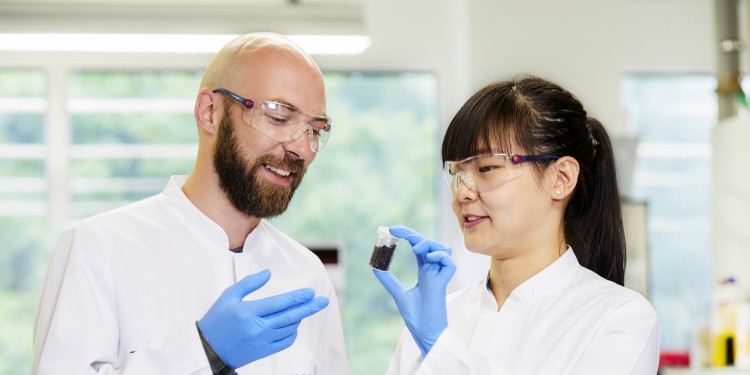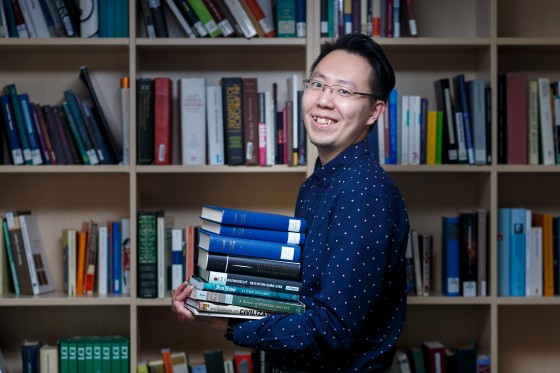
Two paths to a PhD
"It motivates me when I see the results of research being put straight into practice"
What fascinated me during my first visit to MEET were the good facilities in the labs, as well as the specialist knowledge and the store of experience which the people there had. So, after completing my master’s degree at RWTH Aachen, I was delighted to get a position at MEET which is funded through an EU project. I had already dealt with the recycling of batteries and battery research in my master’s thesis. I was born in Tianjin in China, and it was in China that I completed my bachelor’s degree.
I was immediately able to identify with the objective that MEET has: to act as a bridge between science and industry. It motivates me when I see the results of research being put straight into practice. While I spend half my working time on an applications-related project, the other half is spent on my PhD – which is based on the same research projects, but with a stronger scientific alignment.
Doing a PhD in Germany is an ambitious aim, especially for junior researchers from abroad. But this challenge also has a special attraction: in my working environment I not only acquire specialist knowledge about lithium-ion batteries – I also learn soft skills. Many international researchers initially come up against intercultural challenges. What my experience has shown me, though, is that it facilitates communication if you have an open mind towards adapting to your new environment and understanding it. So for international PhD students it’s important to improve your foreign language skills and develop an understanding of the new culture. And once the ice has been broken, you’re welcomed with open arms. The challenges I face make this time valuable for me.
One single lithium-ion battery seems to be a simple thing. In fact, what’s behind it are complicated theories relating to electrochemistry and materials science. Every day at MEET I learn something new in my work and extend my competences. When I improve my skills, when I have – and take – opportunities for development, I’m also, as a foreign PhD student, contributing to international cooperation in the field of battery research.
I have already learnt a lot during my two years at MEET – though I can still learn a lot more. As science and technology are constantly developing further, there is a lot of research still to be done in order to be constantly up-to-date. The more I learn, the better I understand what Socrates said: "I know that I know nothing."
Xiaofei Yang is at the MEET battery research centre, where she has been doing a PhD since March 2017.
"The GSPoL offers exchanges and individual freedom"

And so it was that I embarked on my master’s course at Münster in October 2012. After completing the course, I decided to do my PhD in Münster – and not only because I had already settled down well in the city and was very pleased at the competence shown by the teaching staff, the Institute of German Studies and the University as a whole. What impressed me even more than these aspects was the concept offered by the Graduate School Practices of Literature (GSPoL) – a concept which integrates PhD students in a common, yet flexible, structure. The GSPoL provides a wide range of opportunities for exchanging ideas and views with colleagues from other philologies and countries, and, at the same time, it offers individual freedom.
For anyone in the Humanities, the path to a PhD is often a lonely one. In addition, language barriers make text production – essential for the PhD – more difficult for me. This is why support from my fellow PhD students, as well as in the form of GSPoL events such as lecture series, master classes, working groups and colloquia, and the wide range of cultural activities offered by the city of Münster all suit me very well indeed. When I consider my situation at the beginning, as well as my aim, I must say that I feel very happy with my position – not least because I was fortunate enough to be awarded a PhD scholarship from the China Scholarship Council.
In the summer semester 2019 I will be giving my first seminar – which, as a non-native speaker, I feel is an important success at this stage. I hope that in ten years’ time I can say that this experience marked the beginning of my academic career.
Where do I see opportunities for improvement? Looking back, I missed some guidance at the beginning of my master’s degree course, as well as special language courses at an advanced level. Other forms of support, in other areas, could be expanded. Formats such as, for example, conferences for junior researchers often slip through the usual "support nets". And, lastly, I would like to see a closer exchange of views and ideas between undergraduates and PhD students.
Peilin Li is at the Graduate School Practices of Literature (part of the Department of Philology), where he is writing his PhD dissertation.
This article was originally published in the University newspaper "wissen|leben" No. 2, 3 April 2019
